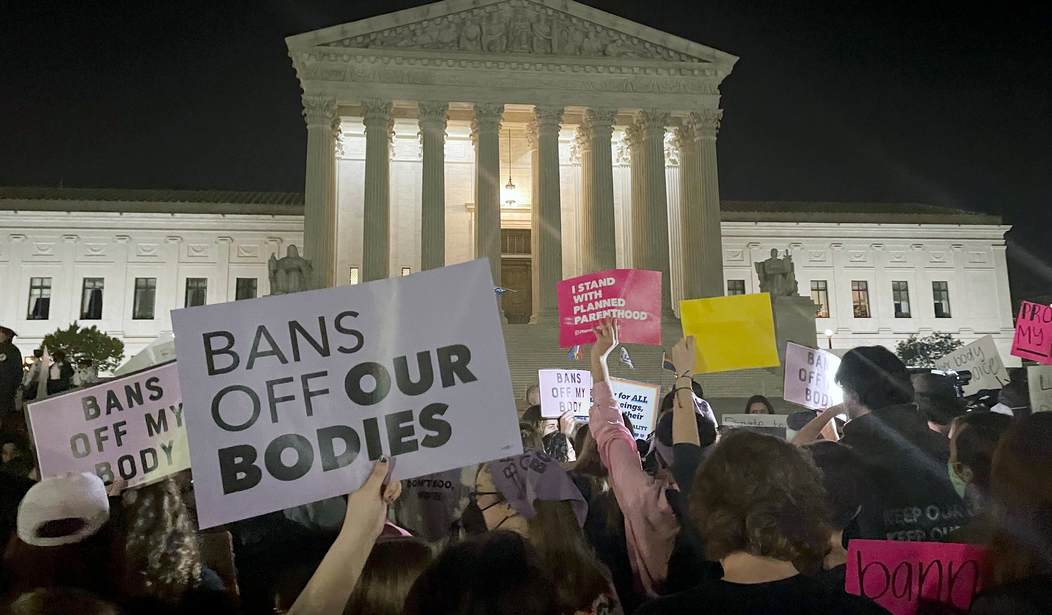Angry mobs of demonstrators threatened to shut down the Supreme Court today in order to protest the presumed evisceration of Roe. Instead, the justices cleared out five lower-profile cases from a backlog that had looked daunting. Even the most interesting of these, a ruling in Kemp v US on sentencing in a firearms case, was a generally unanimous ruling on a technicality.
Maybe the justices want to tire out the demonstrators?
No widely-watched rulings from #SCOTUS today. On to Wednesday. 24 cases remain. No. 5 was a decision finding judges have power to amend decisions in civil cases when they’ve made a mistake of law. Actually arose in Habeas. 8-1. Thomas wrote https://t.co/erf5BSo857
— Josh Gerstein (@joshgerstein) June 13, 2022
5 rulings issued today. That's it.
Court clearing backlog.
— Ed Whelan (@EdWhelanEPPC) June 13, 2022
So nothing on Dobbs, the abortion-restriction case in which Justice Samuel Alito’s draft opinion leaked, and nothing on NYSRPA v Bruen either. That case brings a key Second Amendment issue to the court for the first time in a decade, a challenge to a New York law that used to require a show of cause for a permit to carry a firearm. New York rescinded it in an effort to keep the court from ruling on that issue, but the court refused to moot the case.
The ruling on Kemp went 8-1, with Justice Clarence Thomas authoring the decision, but it didn’t do much other than firm up some technical parameters on appeals. The court ruled that lower courts should have allowed a challenge to a sentencing based on a judicial “mistake” on a point of law. However, Thomas also ruled that Kemp et al still failed to meet the “timely” test in raising the point, which makes this victory an empty one for the plaintiffs:
In sum, nothing in the text, structure, or history of Rule 60(b) persuades us to narrowly interpret the otherwise broad term “mistake” to exclude judicial errors of law. Because Kemp’s Rule 60(b) motion alleged such a legal error, we affirm the Eleventh Circuit’s judgment that the motion was cognizable under Rule 60(b)(1), subject to a 1-year limitations period, and, therefore, untimely.
Justice Sonia Sotomayor issued a brief concurrence to stress that she sees this as no change to previous interpretations of timeliness. Justice Neil Gorsuch only dissented to scold the court for taking the case in the first place:
From the start, granting review was a questionable use of judicial resources. The answer matters only under rare circumstances: A losing party fails to appeal or secure relief under Rule 59(e), opting instead to file a Rule 60(b) motion. That motion comes more than a year after judgment but— piling contingency on contingency—within what the court would otherwise deem a “reasonable time.” Rule 60(c)(1). By petitioner’s own (uncontested) count, his is the first petition ever to present today’s question for this Court’s review. See Pet. for Cert. 24; Brief in Opposition 26. Beyond even that, an alternative route exists to resolve the question posed here. Congress has adopted the Rules Enabling Act. See 28 U. S. C. §§ 2071–2077. Under its terms, a committee composed of judges and practitioners may recommend to this Court any warranted clarifications to the Federal Rules of Civil Procedure. § 2073. Those recommendations generally take effect upon our approval and absent congressional objection. § 2074. …
Respectfully, I would have dismissed the writ of certiorari as improvidently granted. Not only does this case fail to meet our usual standards for review. … Questions like these are best resolved not through a doubtful interpretive project focused on a pronoun dropped in 1946, but through the rulemaking process. There, policy interests on both sides can be accounted for and weighed in light of the “collective experience of bench and bar.”
Gorsuch’s derision on Kemp v US aside, there are no such things as unimportant Supreme Court cases. Their scrutiny automatically raises up the issues involved even in very technical matters to precedential level, so the rulings matter in every case. Still, no one but the parties involved were sitting on the edge of their seats for Kemp or ZF Automotive US v Luxshare LTD. The issues of immigration enforcement may have made Garland v Gonzalez a bit more interesting, with a 6-3 denial of the appeal by appellants to allow them a class-action status to challenge DHS enforcement of immigration law. Even that, though, has limited impact as it relates to access to bond hearings that the appellants had a legal right to demand individually.
The significant number of cases released today may tell us a couple of things about the court. First, they seem to want to speed up releases to get out on time at the end of this month, and with 24 cases left to conclude, they may well be on pace now to keep from having to extend the term into July. And second, they may be hoping to exhaust the mobs by waiting until the end to release Dobbs and Bruen, although the simpler explanation there is that the Supreme Court usually releases its most controversial and heavily debated cases at the very end of the term. We can hope, though, that the mobs will get exhausted enough over the next couple of weeks anyway.








Join the conversation as a VIP Member